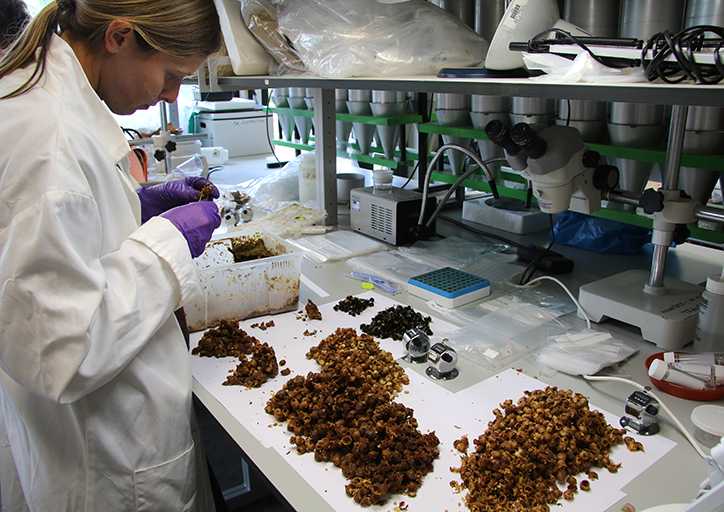
Scientists have published results of a large-scale experiment linking neonicotinoid seed treatments to honeybee population decline.
Researchers from the Centre for Ecology & Hydrology (CEH) have published the results in the peer-review journal Science.
The experiment – undertaken in the UK, Germany and Hungary – exposed three bee species to winter oilseed rape crops treated with seed coatings containing neonicotinoid clothianidin, from Bayer CropScience, or Syngenta’s thiamethoxam.
Agrochemical companies, such as Bayer and Syngenta, have criticised the findings of the study by calling them 'inconclusive'.
The National Farmers' Union (NFU) has said that neonicotinoid seed treatments form an 'incredibly important' part of the integrated pest management approach which farmers adopt.
But environmental groups have celebrated the findings, with Friends of the Earth calling for a 'complete and permanent ban'.
Designed to kill pests
Neonicotinoid seed coatings are designed to kill pests such as the cabbage stem flea beetle, but were effectively banned in the EU in 2013 due to concerns regarding their impact on bee health.
The researchers found that exposure to treated crops reduced overwintering success of honeybee colonies – a key measure of year-to-year viability – in two of the three countries.
In Hungary, colony number fell by 24 percent in the following spring. In the UK, honeybee colony survival was generally very low, but lowest where bees fed on clothianidin-treated oilseed rape in the previous year.
No harmful effects on overwintering honeybees were found in Germany.
'Reduced capacity'
Lower reproductive success – reflected in queen number (bumblebees) and egg production (red mason bee) – was linked with increasing levels of neonicotinoid residues in the nests of wild bee species buff-tailed bumblebee (Bombus terrestris) and the Red Mason Bee (Osmia bicornis) across all three countries.

According to the CEH lead author, Dr Ben Woodcock: "The neonicotinoids investigated caused a reduced capacity for all three bee species to establish new populations in the following year, at least in the UK and Hungary."
He suggests the differing impacts on honeybees between countries may be associated with interacting factors including the availability of alternative flowering resources for bees to feed on in the farmed landscape as well as general colony health, with Hungarian and UK honeybees tending to be more diseased.
In contrast, the hives in Germany happened to be larger, showed little evidence of disease and had access to a wider range of wild flowers to feed on.
Dr Woodcock suggests that this may explain why in this country alone there was no evidence of a negative effect of neonicotinoids on honeybees.
The study, spanning 2,000 hectares, equivalent to 3,000 full scale football pitches, took account of bee disease and surrounding landscape quality in addition to colony growth rate, worker mortality and overwinter survival.
'Positive attributes'
Dr Woodcock explained that neonicotinoid seed dressings do have positive attributes.
"They target insects that damage the plant, can be applied to the seed at low dosage rates but protect the whole plant and reduce the need for broad spectrum insecticide sprays.
"Their use as an alternative chemical control option is also useful in controlling pests where insecticide resistance to other pesticides is already found, so play an important role to play in food production."
"There may be opportunities to mitigate negative impacts of neonicotinoid exposure on bees through improved honeybee husbandry or availability of flowering plants for bees to feed on across non-cropped areas of the farmed landscape. Both these issues require further research.
He added: "The negative effects of neonicotinoids on wild bees may also be the result of diverse mechanisms of exposure that include persistent residues of neonicotinoids in arable systems due to their widespread and often very frequent use."
Bayer CropScience and Syngenta funded the research assessing the impact of neonicotinoids on honeybees. The Natural Environment Research Council funded the analysis of the impact on the wild bees.
'Devastating consequences'
The study comes as news that a Conservative MEP failed to stop a complete EU ban on neonicotinoid pesticides.
It prompted Labour’s Shadow Environment Secretary Sue Hayman to write an open letter to Defra secretary Michel Gove for clarification on the government's position on neonicotinoids.
However, France is one of the first EU countries to go ahead with a complete ban. The French Prime Minister has said the country is set to go-ahead with a neonicotinoid pesticide ban, which is due to come into effect in 2018.
But some farming groups criticised the move saying the pesticides are 'vital' in protecting the UK's crops from pests.
The NFU has said a blanket ban would have devastating consequences on outdoor crops, and the effect this would have on farming businesses.
Rothamsted Research said production of UK crops is at risk if neonicotinoids are more widely restricted or banned completely.
The call comes in response to European Commission proposals to widen current neonicotinoid restrictions to ban all uses on field-grown crops, extending its current restrictions to include non-flowering crops.
